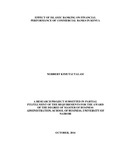Effect of Islamic banking on financial performance of commercial banks in Kenya
Abstract
Shari’ah compliant banking is viewed by many as the fastest growing segment of the
banking sector in the world. The uptake of Islamic banking is projected to grow
exponentially in sub-Saharan Africa (Ndung’u, 2011). The study sought to establish
the effect of Islamic banking on financial performance of commercial banks in Kenya.
This research was conducted through a descriptive survey design. The descriptive
survey design was considered appropriate as it enables description of the
characteristics of certain groups, estimation of the proportion of people who have
certain characteristics and making of predictions. This study collected quantitative
data. Secondary data was used in this study. The secondary data sources were
obtained from the published annual reports of the 13 commercial banks under study
over a period of 5 years (2009-2013). The data was collected based on the information
about the variables. Quantitative data was analyzed by descriptive analysis while
qualitative data through content analysis. The study may provide information to
policy makers, managers of Islamic banks, scholars and academicians and investors
on effect of Islamic banking on financial performance of commercial banks in Kenya.
From the findings, the study found out that the banks’ capital ratio, liquidity ratio,
bank size and Islamic banking ratio had a positive influence on the commercial banks’
financial performance. The study further established that the banks’ efficiency ratio
and the expenses management ratio had a negative influence on the commercial
banks’ financial performance. Thus, the study concludes that Islamic banking
positively influenced the financial performance of the commercial banks in Kenya.
The study recommends that the management of the commercial banks should strive to
achieve an optimal capital structure, enhance their banks’ liquidity, efficiency and
expenses management levels as well as expand their market reach in order to enhance
the financial performance of their commercial banks.

